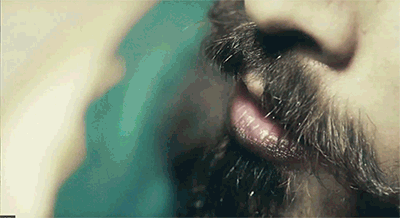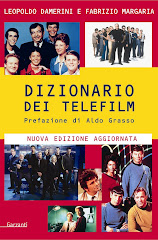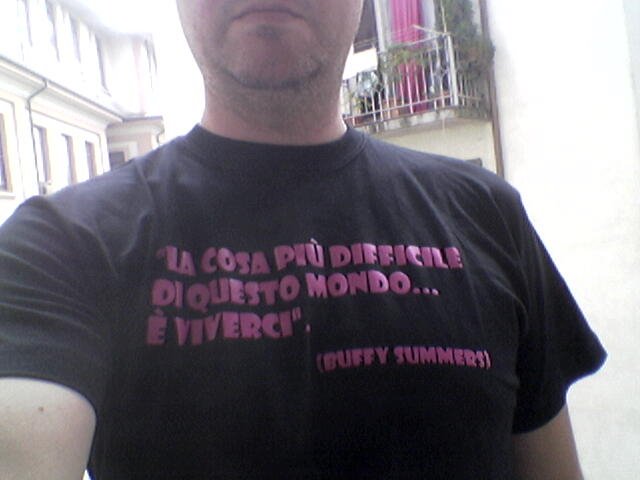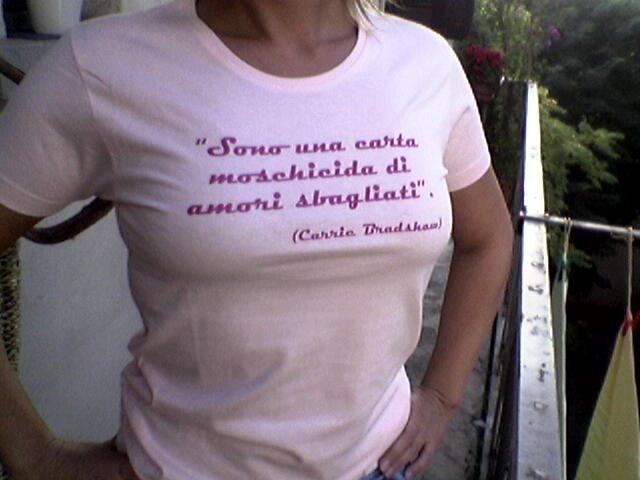NEWS - Lesbica all'arancio! La sconvolgente-coinvolgente presa di coscienza di Lauren Morelli, che si è scoperta gay mentre scriveva la sceneggiatura di "Orange Is The New Black"
La confessione di
Lauren Morelli a "
PolicyMic"
"I was underdressed the day we shot Larry's pivotal phone call with Piper for the first season of Orange is the New Black.
It was 9 degrees on Fifth Avenue, and I wore New Balances and a pair of
wool socks — but I sucked it up because this was the climax of their
season-long arc: A scene where both characters are finally forced to be
honest after months of lying to each other. It was a scene I'd written
with words shamelessly borrowed from my own life, and as I watched Jason
Biggs repeat "I don't know if you can," after Piper begs him to let her
fix her mistakes, the world around me swirled in a dizzying blur of
life imitating art. Or vice versa — it's hard to say sometimes. By the
end of the day I mostly was trying not to cry, and I also couldn't feel
my feet.
In any story worth telling, there's conflict. And so, while
it certainly would have been disorienting to begin to question my
sexuality after three decades of knowing myself, it was particularly
blinding because I'd gotten married only a few months before. It was the
sort of wedding that makes you believe in absolute partnership and the
strength that can come from facing obstacles, like the life-threatening
illness that my new husband had battled for the majority of our
relationship. But he was healthy again, so we danced under strings of
Christmas lights and drank fancy cocktails that were served in mason
jars, all while being surrounded by the friends and family who had held
us up over the previous six years.
Which is why it's now a punch in the gut every time I have
to say, "I'm getting divorced because I'm gay." It's a sentence I've
said approximately 5,223 times in the last six months. For those of you
keeping track, I'm definitely not exaggerating and I'm not prone to
hyperbole, ever.
Often, after I make the declaration in as casual a voice as
I can manage, the next question is, "Did you know?" It's a question
that I dread because I always hear the implied "How could you not know?"

The thing is, even when you find yourself in a minority,
there's always a majority. If I was really gay, I would have known when I
was younger. There was a prescribed narrative, and everything about my
own story challenged the accepted one.
Five months after my wedding, I flew to New York to start production on my first episode of Orange,
and from that moment on my life fell into a parallel rhythm with
Piper's story in a way that went from interesting to terrifying in a
matter of months.
"You're so gay!" people exclaimed gleefully and often in
the writers’ room those first few months. It was my first professional
writing job, and I quickly discovered that the writers' room was a
remarkably intimate place: We shared details of fights with our
significant others or childhood family secrets that might be cloaked in
shame otherwise, and at the end of the day, all of it could be distilled
into material that made the show richer.
As we started to shape our characters and debate fictional
Piper's "true" sexuality that first season, we engaged in long
discussions about sex, gender and our own experiences. I eagerly shared
details of innocent, "above-the-waist" flirtations with girls when I'd
been younger. I'd even excitedly blurted out, "I would totally sleep
with her," about an actress who had auditioned for Alex (now played
brilliantly by Laura Prepon, who shares the role with a pair of
glasses). I went to therapy that night and casually mentioned
that perhaps I was higher on the Kinsey Scale than I previously thought.
The sound stage for Orange, where we proudly
employ what has to be at least 64% of lesbians in the New York City
metro area, is not a place where you can shy away from women or
sexuality. And if you're trying to, Lea Delaria (Big Boo) will nip it in
the bud by inviting you to sit on her lap.
Accordingly, I was nervous about the first love scene I'd
written for Alex and Piper. I'd loved writing it, loved watching a
tenderness emerge in their relationship where passion always seemed to
be the ruling principle, but by that time, I was so deep in my own
self-doubt that I constantly felt like a fraud. I was sure it was
bleeding into my writing. How could it not? I was married to a man, but I
wasn't straight.
"I heart you."
"I heart you? Is that like 'I love you' for pussies?"
As I watched Taylor Schilling and Laura film the scene, one
of our producers (as it happened, a gay woman) tapped me on the
shoulder. She pointed at the screen and gave me a thumb's up. It was a
small gesture, but my first step toward feeling accepted and quietly
accepting myself. In Piper and Alex, I'd found a mouthpiece for my own
desires and a glimmer of what my future could look like.
Outside of small victories on the show, I continued to
spiral downward. I felt like my life was being rewritten without my
permission. I'd checked all my boxes! I was happily married and loved my
job!
Things were finally great, for fuck's sake.
I realized I was gay in fall 2012, one of my first days on
the set. It wasn't so much one thing, but the sum of many small details:
how uncomfortable I felt around groups of lesbians or how I considered
myself (shrug) a "not very sexual person." When considered alone, these
seemed like little quirks that made me me. Wanting to read a book
instead of have sex is a perfectly reasonable preference to have, right?
But on set, these small moments came into sharp relief, and
I found myself answering to an endless stream of cast members who
peppered me with questions like a gaggle of kindergartners curious about
their new teacher. "Are you dating anyone?" "You're married?" "To a
man?" "But you used to kiss girls?" "Do you miss it?"
I was finally forced to consider a question that had never, ever occurred to me before: Holy shit, am I gay?
Despite being 31 years old, having lived in extremely
liberal cities for 13 years of my life and considering myself an
educated individual, over the last year I:
1. Googled "How do you know if you're a lesbian?" There had to be, like, a quiz or something, right?
2.
Wondered if it was my birth control. I'd just switched to an IUD, could
it be affecting whom I was attracted to? Really. That was a thing I
thought and even went as far as mentioning it to my therapist, who has a
doctorate in sexual identity and did a very good job patiently
explaining that, no, birth control couldn't change essential sexual
preference.
3. Wanted to die. If being gay meant losing the
person I loved most in the world, if it meant coming out to my parents
and tearing open the most vulnerable, soft parts of myself and showing
them to everyone I knew, I would rather be dead. I was suicidal in a way
that I hadn't been since eighth grade, when I took a bunch of Tylenol
and went to sleep. The next morning I woke up feeling refreshed from the
great sleep and excited that I could tell my friends about how
depressed I was.
It feels important to say these things in a public way, to record
them where they are easily accessible because if I could think and feel
them while working in the world's most supportive environment,
surrounded by people in the LGBT community, where being a minority of
any sort is joyfully celebrated, I can only venture to imagine the pain,
confusion and fear that might have existed otherwise.

I attended the GLAAD awards recently, where I had the
privilege of witnessing Ellen Page present Laverne Cox with the Stephen
F. Kolzak Award. GLAAD's president, Sarah Kate Ellis, also spoke that
evening, and encouraged the room to live their lives openly and with
love, in full view of any opposition that might exist.
Mourning the end of my marriage and the identity that I'd known for
my entire life, I hadn't yet stopped to consider that I was now a part
of this community. I'd been qualifying my own gayness as if it somehow
counted less or might be judged if I embraced it fully.
After lugging around a basket full of shame and guilt for the last
year, there was a lightness that came with realizing that I could choose
to replace my negative framing with honesty and grace.
I am now out to my family, my friends and most of my co-workers on Orange
(and now to you, dear reader). Now, when I am in the writers' room or
on set, I no longer feel like I am stuck in the middle of two truths. I
belong because my own narrative fits in alongside the fictional stories
that we are telling on the show: stories of people finding themselves,
of difficult paths and of redemption.
I won't spoil anything for you, but I am tremendously proud of my own contributions to season 2 of Orange is the New Black.
It was in the writers' room that I came into myself, surrounded by
unconditional love and teasing when I needed it (like when I was so
depressed that I wore a hoodie and a baseball cap for too many days in a
row and someone asked me if I was trying to be an undercover cop).

I went through it all on set: I fell in love with a woman,
and I watched my life play out on screen. And now, as we are gearing up
for the release of season 2, it feels liberating and appropriate to live
my life in front of you.
I am not perfect. I would rather be comfortable than brave. I also wouldn’t mind your approval because that always feels nice.
And yet. This is my story, which is messy and nuanced and a
constantly moving target, but one I'm grateful for. I encourage you to
embrace your own narrative, whatever that may be. It will be worth the
effort. I promise".
+-+Servizio+GQ.jpg)
+-+Servizio+GQ+(2).jpg)
+-+Servizio+GQ+(3).jpg)
+-+Servizio+GQ+(4).jpg)
+-+Servizio+GQ+(5).jpg)
+-+Servizio+GQ+(6).jpg)
+-+Servizio+GQ+(7).jpg)
+-+Servizio+GQ+(8).jpg)
+-+Servizio+GQ+(9).jpg)
+-+Servizio+GQ+(10).jpg)



























.jpg)















